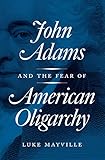John Adams and the Fear of American Oligarchy / Luke Mayville.
Material type: TextPublisher: Princeton, NJ : Princeton University Press, [2016]Copyright date: ©2017Description: 1 online resource (232 p.)Content type:
TextPublisher: Princeton, NJ : Princeton University Press, [2016]Copyright date: ©2017Description: 1 online resource (232 p.)Content type: - 9780691171531
- 9781400883691
- 973.44092 23
- E322 .M36 2019eb
- online - DeGruyter
| Item type | Current library | Call number | URL | Status | Notes | Barcode | |
|---|---|---|---|---|---|---|---|
 eBook
eBook
|
Biblioteca "Angelicum" Pont. Univ. S.Tommaso d'Aquino Nuvola online | online - DeGruyter (Browse shelf(Opens below)) | Online access | Not for loan (Accesso limitato) | Accesso per gli utenti autorizzati / Access for authorized users | (dgr)9781400883691 |
Browsing Biblioteca "Angelicum" Pont. Univ. S.Tommaso d'Aquino shelves, Shelving location: Nuvola online Close shelf browser (Hides shelf browser)

|

|

|

|

|

|

|
||
| online - DeGruyter Mother of Mercy, Bane of the Jews : Devotion to the Virgin Mary in Anglo-Norman England / | online - DeGruyter Tolerance among the Virtues / | online - DeGruyter Free Time / | online - DeGruyter John Adams and the Fear of American Oligarchy / | online - DeGruyter Marx's Inferno : The Political Theory of Capital / | online - DeGruyter Longing for the Lost Caliphate : A Transregional History / | online - DeGruyter The Political Poetess : Victorian Femininity, Race, and the Legacy of Separate Spheres / |
Frontmatter -- Contents -- Acknowledgments -- Introduction -- Chapter One. A Perennial Problem -- Chapter Two. The Goods of Fortune -- Chapter Three. Sympathy for the Rich -- Chapter Four. Dignified Democracy -- Conclusion. American Oligarchy? -- Notes -- Bibliography -- Index
restricted access online access with authorization star
http://purl.org/coar/access_right/c_16ec
Long before "the one percent" became a protest slogan, American founding father John Adams feared the power of a class he called simply “the few”—the wellborn, the beautiful, and especially the rich. In John Adams and the Fear of American Oligarchy, Luke Mayville presents the first extended exploration of Adams's preoccupation with a problem that has a renewed urgency today: the way in which inequality threatens to corrode democracy and empower a small elite. By revisiting Adams’s political writings, Mayville draws out the statesman’s fears about the danger of oligarchy in America and his unique understanding of the political power of wealth—a surprising and largely forgotten theory that promises to illuminate today’s debates about inequality and its political consequences.Adams believed that wealth is politically powerful in modern societies not merely because money buys influence, but also because citizens admire and even sympathize with the rich. He thought wealth is powerful in the same way that beauty is powerful—it distinguishes its possessor and prompts reactions of approval and veneration. Citizens vote for—and with—the rich not because, as is often said, they hope to be rich one day, but because they esteem the rich and submit to their wishes. Mayville explores Adams’s theory of wealth and power in the context of his broader concern about social and economic inequality, and also examines his ideas about how oligarchy might be countered.A compelling work of intellectual history, John Adams and the Fear of American Oligarchy also has important lessons for today’s world of increasing inequality.
Mode of access: Internet via World Wide Web.
In English.
Description based on online resource; title from PDF title page (publisher's Web site, viewed 29. Jun 2022)


